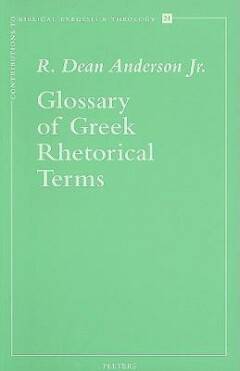
- Retrait gratuit dans votre magasin Club
- 7.000.000 titres dans notre catalogue
- Payer en toute sécurité
- Toujours un magasin près de chez vous
- Retrait gratuit dans votre magasin Club
- 7.000.0000 titres dans notre catalogue
- Payer en toute sécurité
- Toujours un magasin près de chez vous
Glossary of Greek Rhetorical Terms Connected to Methods of Argumentation, Figures and Tropes from Anaximenes to Quintilian
Jr Anderson Rd
15,00 €
+ 30 points
Description
This Glossary was written as a companion volume to Anderson's Ancient Rhetorical Theory and Paul. It is of course far more than a glossary in the strict sense of that word, providing the reader with a brief overview of the varied use of a given term in the works of the rhetorical theorists from Anaximenes (end of the 4th century BC) through to Quintilian (end of the first century AD). For this time period an attempt has been made to provide the reader with an exhaustive list of referencess to the primary texts. The Glossary is primarily intended as an aid to those attempting to use and apply Greek rhetorical methods of argumentation (excluding the theoretical stasis terminology), figures and tropes to literature of the Hellenistic and early Imperial period. That is, however, not to say that use of this glossary may not be handy for those wishing to utilise later sources. Whilst the Glossary also includes reference to later sources where these illuminate concepts functioning within the target period, the use of this work in conjunction with the reading of late rhetorical sources should aid the reader in determining where theoretical or terminological development is taking place, and where the sources are clearly relying upon traditional concepts. The Glossary is not intended to replace the study of primary rhetorical texts, but to facilitate this study by providing a brief overview and by pointing the reader to appropriate passages in various works which may then be further consulted.
Spécifications
Parties prenantes
- Auteur(s) :
- Editeur:
Contenu
- Nombre de pages :
- 131
- Langue:
- Anglais
- Collection :
- Tome:
- n° 24
Caractéristiques
- EAN:
- 9789042908468
- Date de parution :
- 04-04-00
- Format:
- Livre broché
- Format numérique:
- Trade paperback (VS)
- Dimensions :
- 150 mm x 226 mm
- Poids :
- 204 g

Les avis
Nous publions uniquement les avis qui respectent les conditions requises. Consultez nos conditions pour les avis.






